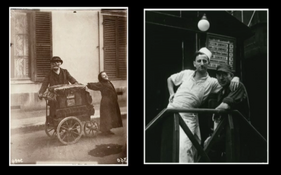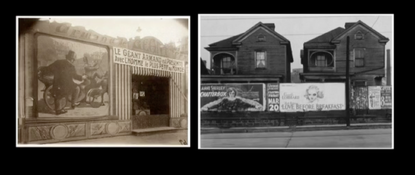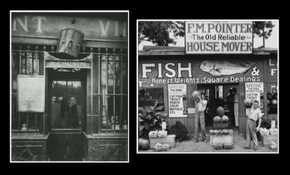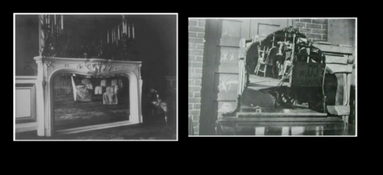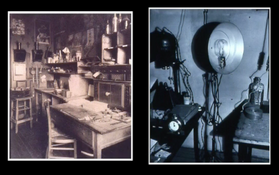I can’t resist sharing another text from my teacher that speaks to that very sense of enjoyment.
What I see in that text is mostly a set of assumptions on the nature of photography which are debatable at best, and factually incorrect at worst. The way I read that text, the man has an incredibly restricted, limited view of the medium as well as the art. 'Good for him; what gives', you might say - but the implication is that he disregards many ways of appreciating or assessing photographic works based on his misdirected reasoning.
Let's see:
First and foremost, it is the only art form that does not owe its origin to religion.
Factually, we cannot know whether this also applies to other art forms or not. Humans have painted, sculpted and drawn in past ages long before we have any information on what religion they practiced. Moreover, the question whether an art form at any point (at its beginning, or somewhere along the way) was intertwined with religion is barely relevant for its potential for use, enjoyment and present or future embedding in a cultural context. So simply put, regardless if what he says is true (which is unverifiable, even though it's stated as a fact), it's irrelevant.
these images have neither materiality nor uniqueness
Define "materiality", and then apply that definition to a photographic print. The inevitable conclusion is that the author has, as said above, a narrowminded view of the medium.
The same applies to uniqueness; this argument likewise crumbles once it's scrutinized by operationalizing the definition and then assessing the medium on that basis.
Consequently, what matters is the artist's gaze and the personal world it expresses.
Which is just as true, or untrue, for any other art form. Photography isn't different in this respect.
One could even argue that photography, the most "objective" art form — using an extremely precise mechanical recording and reproduction of already living images — ultimately becomes the most personal, as the only intervention by the artist is the selection driven by their gaze.
One could argue, yes, but one would find their argument shattered to pieces upon closer scrutiny.
The only version of photographic art that might lend itself to classification into schools and trends reminiscent of those known from the world of painting is photography that seeks to identify with a visual approach, thus shifting the focus from the gaze and transformation to its material surface and the external management of its messages.
Right, couple of things happening here. Note the 'only' bit at the front - we're getting exclusive here. Thank you Mr. Enlightened Critic for guiding us to the Only Twue Way.
Moreover, the argument here seems to be that classification into schools is only possible on the basis of intent. There are two problems with this. Firstly, it's simply not true - art has been classified, put into taxonomies and typologies pretty much forever, regardless of artist's intent. Secondly, photography, like every other artistic medium, involves the inevitable making of choices w.r.t. technique and materials. Regardless of intent concerning content, these material ("material" in two senses: significant as well as pertaining to materials) choices affect the "external management of its messages" (is this text taken from a playing card for the monthly consultants' bullshit bingo??)
And so on, and so forth. Literally NOTHING of the argumentation holds up to critical assay. Ultimately, whatever conclusion is drawn, in this case one that forces the viewer to assess by intent, can only be shaky at best and most likely outright wrong. What's more - what's the value of this conclusion to begin with? " whether the aim is information or poetry, documentation or transformation. The boundaries may not always be clear, but the effort to discern them aids in approaching the medium with the goal of enjoyment." Is that what he has to offer? After a lengthy session of thesaurus abuse, he comes up with a vaguely formulated distinction between three types of intent, which in reality represent three dimensions that are not mutually exclusive to begin with. Good grief.
And ultimately what does all this have to do with appreciation of Atget's photographs, or Mr Jones' who lives just around the corner? There could be either of two things going on here:
1: We're looking at the intellectual excrement of someone who believes their thoughts are so uniquely inspiring, original and informative that they simply *must* be conveyed to a larger audience so that they may be enlightened in the same way he is.
2: These are the somewhat confused, but well-intended ramblings of someone who has a deep appreciation for photography, but struggles (don't we all!) to make sense of something that in its basis defies sensemaking, which is one of the main reasons it's so appealing.
I'm going to go with option (2), although I can't shake the impression that there's a dash of (1) going on, which I personally find somewhat irritating, but hey - who who casts the first stone and all that. Given that it's likely mostly #2, the implication is that the mystery that your teacher has "uncovered" here is a sublimation of
his personal, private, subjective experience of wonder at the world he's looking at. As an entirely personal and idiosyncratic way of looking at things, the question again is how this is supposed to enhance anyone's enjoyment of images? For all I care, all time spent on reading that pseudo-intellectual dribble is time not spent looking at photographs, and thus takes away from the enjoyment more than adding to it.
What I hope is that Eugene Atget might enhance that enjoyment if you give his work a chance and dive into his world. If not, that’s perfectly fine — he may not resonate with you, or perhaps the timing isn’t right.
You seem to keep making implicit assumptions about my appreciation of Atget's photography. Whether or not, the extent to which, the time I may or may not have spent trying to, and the ways in which I may or may not appreciate Atget's works have for the most part not been mentioned in the first place.
If you wonder why I'm so fierce in criticizing the critique you posted, ask yourself why you felt compelled to enlighten people with your teacher's musings in the first place.
That is the problem I'm trying to address. If a pair of Jehova's witnesses come knocking at my door in the hopes of bringing me salvation, I politely, smilingly and in a friendly way tell them to go take a hike. Which they do, and that ensures that the exchange remains friendly and polite.



